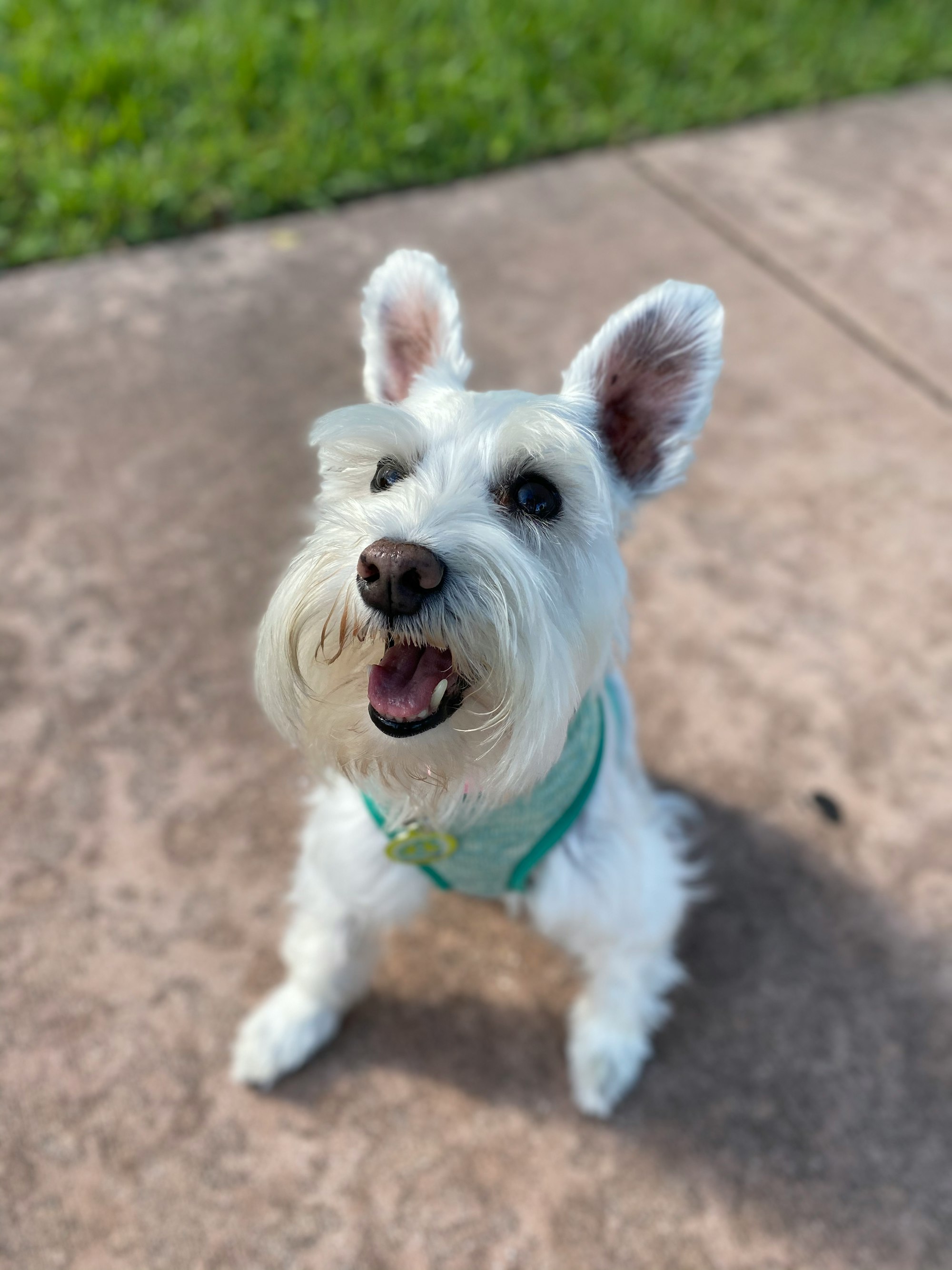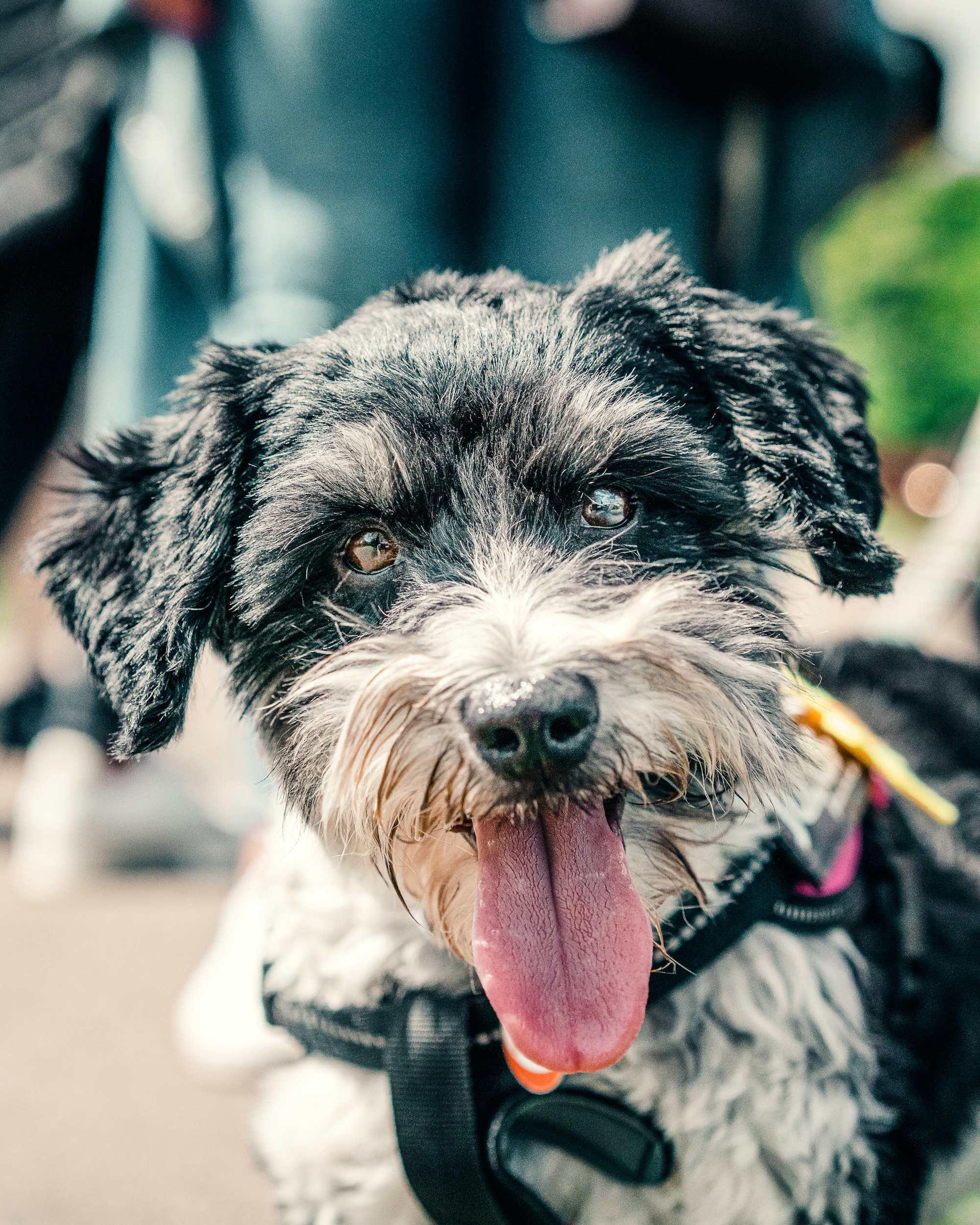Schnauzers are known for their distinctive appearance and charming personalities. These small to medium-sized dogs have captured the hearts of many pet lovers around the world. In recent years, the popularity of Schnauzer mixes, also known as designer dogs, has been on the rise. These mixed breeds combine the best traits of the Schnauzer with other breeds, creating unique and adorable companions. In this article, we will explore some of the most popular Schnauzer mixes, their characteristics, and what to expect when bringing one into your home.

Schnauzer mixes are the result of breeding a Schnauzer with another purebred dog. These crossbreeds combine the unique physical and behavioral traits of both parent breeds, resulting in a wide variety of appearances and personalities. It's important to note that while Schnauzer mixes may inherit certain characteristics from their parents, each dog can vary in their traits.
1. Schnoodle: The Schnauzer and Poodle Mix
The Schnoodle is a popular Schnauzer mix that combines the intelligence and low-shedding coat of the Poodle with the playful and friendly nature of the Schnauzer. This crossbreed is known for its hypoallergenic qualities, making it an ideal choice for individuals with allergies. Schnoodles are highly adaptable and get along well with children and other pets. Their wavy or curly coat requires regular grooming to prevent matting.
2. Schneagle: The Schnauzer and Beagle Mix
The Schneagle is a charming mix of the Schnauzer and Beagle. These dogs often inherit the Schnauzer's wiry coat and the Beagle's distinctive coloring and scenting abilities. Schneagles are energetic and intelligent, requiring regular exercise and mental stimulation. They are known for their friendly and outgoing personalities, making them great family pets.
3. Schnauzador: The Schnauzer and Labrador Retriever Mix
The Schnauzador combines the Schnauzer's alertness and loyalty with the Labrador Retriever's friendly and gentle nature. These mixes are usually medium to large and make excellent companions and family dogs. Schnauzadors are highly trainable and eager to please, making them suitable for various activities such as obedience training and agility.
4. Schnauzerdoodle: The Schnauzer and Goldendoodle Mix
The Schnauzerdoodle is a crossbreed between the Schnauzer and the popular Goldendoodle. This mix combines the Schnauzer's intelligence and the Goldendoodle's hypoallergenic coat. Schnauzerdoodles are friendly, and affectionate, and make great therapy dogs. They require regular grooming to maintain their coat's condition and prevent matting.
5. Schneizer: The Schnauzer and Cocker Spaniel Mix
The Schneizer is a delightful mix of the Schnauzer and Cocker Spaniel. These dogs often inherit the Schnauzer's wiry coat and the Cocker Spaniel's charming and affectionate nature. Schneizers are known for their friendly personalities and get along well with children and other pets. They require regular exercise and grooming to keep them healthy and happy.
6. Schweenie: The Schnauzer and Dachshund Mix
The Schweenie is a unique blend of the Schnauzer and Dachshund. These mixes often have the Schnauzer's wiry coat and the Dachshund's elongated body. Schweenies are lively, intelligent, and loyal companions. They can be a bit stubborn at times, so early training and socialization are essential. With their affectionate nature, they thrive in families where they receive plenty of love and attention.
7. Schnauzer Terrier Mixes
In addition to Schnauzer mixes with specific breeds, there are also various Schnauzer Terrier mixes. These combinations often result in energetic and spirited dogs with a strong prey drive. Some popular Schnauzer Terrier mixes include the Schnauzer Yorkie mix (Snorkie), Schnauzer Jack Russell mix (Schnauzer Russell), and Schnauzer Westie mix (Schwestie). These mixes require early training, socialization, and mental stimulation to channel their energy properly.
8. Schnauzer Mixes with Non-Terrier Breeds
Schnauzer mixes can also result from breeding Schnauzers with non-terrier breeds. These crossbreeds offer a wider range of sizes, temperaments, and coat types. Let's take a look at some popular Schnauzer mixes with non-terrier breeds:
9. Schnau-Tzu: Schnauzer and Shih Tzu Mix
The Schnau-Tzu is a delightful combination of the Schnauzer and the Shih Tzu. These mixes often inherit the Schnauzer's wiry coat and the Shih Tzu's soft and luxurious coat. Schnau-Tzus are known for their friendly and outgoing personalities. They make excellent family pets and get along well with children and other pets.
10. Schnau-Frise: Schnauzer and Bichon Frise Mix
The Schnau-Frise is a charming crossbreed between the Schnauzer and the Bichon Frise. These mixes typically have a curly or wavy coat that requires regular grooming. Schnau-Frises are affectionate, playful, and great companions for families and individuals alike. They have a lively disposition and thrive on human companionship.
11. Schnau-Cavalier: Schnauzer and Cavalier King Charles Spaniel Mix
The Schnau-Cavalier is a mix between the Schnauzer and the Cavalier King Charles Spaniel. These dogs often have the Schnauzer's wiry coat and the Cavalier's soft and feathered coat. Schnau-Cavaliers are known for their gentle and affectionate nature. They are excellent family pets and are especially good with children.

When considering a Schnauzer mix with a non-terrier breed, it's critical to research and understands the characteristics of both parent breeds. Each mix will have its unique traits and care requirements. Take into account factors such as size, energy level, grooming needs, and temperament to choose the right Schnauzer mix for you.
Choosing the Right Schnauzer Mix for You
Choosing the right Schnauzer mix for you and your family is a typical decision. Here are some factors to consider:
1. Lifestyle: Consider your lifestyle and activity level. Some Schnauzer mixes, like the Schnoodle or Schnauzador, require more exercise and mental stimulation, while others may be more laid-back.
2. Size: Schnauzer mixes come in a range of sizes, from small to medium-sized dogs. Determine the size that fits well with your living space and preferences.
3. Coat Type: Schnauzer mixes can have different coat types, including wiry, curly, or soft. Consider the grooming needs and your preference for coat maintenance.
4. Temperament: Research the temperament of the Schnauzer mix you are interested in. Some mixes may be more independent, while others may be more sociable and outgoing.
5. Compatibility: Consider the compatibility of the Schnauzer mix with your family members, including children and other pets. Ensure the mix you choose will get along well with everyone in the household.
By taking these factors into account and doing thorough research, you can find the perfect Schnauzer mix that matches your lifestyle and preferences.
Training and Exercise Needs
Proper training and exercise are essential for Schnauzer mixes to thrive both physically and mentally. Here are some important considerations:

Training:
· Start training your Schnauzer mix from a young age to establish good behaviors and obedience.
· Use positive reinforcement techniques such as rewards, treats, and praise to motivate and encourage your dog.
· Socialize your Schnauzer mix early on to ensure they are comfortable and well-behaved around other people, animals, and various environments.
· Enroll in obedience classes or work with a professional dog trainer to help you and your dog learn together.
Exercise:
· Schnauzer mixes are generally energetic dogs that require regular exercise to stay happy and healthy.
· Provide daily walks or runs to fulfill their physical activity needs.
· Engage in interactive play sessions with toys to stimulate their minds and burn off excess energy.
· Consider activities like agility training, hiking, or playing fetch to keep them mentally and physically challenged.
· Mental stimulation through puzzle toys or obedience training sessions can also be beneficial for their overall well-being.
Grooming and Maintenance
Grooming requirements for Schnauzer mixes can vary depending on their coat type. Here are some general guidelines:
· Brush your Schnauzer mix's coat regularly to prevent matting and keep it clean and healthy.
· If your Schnauzer mix has a wiry or coarse coat, hand-stripping may be necessary to maintain its texture. Consult with a professional groomer for the best approach.
· Regularly trim their nails to keep them at a proper length.
· Clean their ears regularly to prevent infections and remove any debris or wax buildup.
· Brush their teeth regularly and schedule professional dental cleanings as recommended by your veterinarian.
· Check their eyes for any signs of redness, irritation, or discharge. If you notice any issues, consult with your veterinarian.
Additionally, it's significant to maintain a nutritious diet, provide fresh water at all times, and schedule regular veterinary check-ups to monitor your Schnauzer mix's overall health and address any potential concerns.
By investing time and effort in training, exercising, and grooming your Schnauzer mix, you can ensure they lead a happy, healthy, and well-balanced life.

Health Considerations
When it comes to Schnauzer mixes, it's necessary to be aware of potential health issues that can arise from both parent breeds. While crossbreeding can sometimes reduce the risk of certain genetic conditions, it's essential to stay informed and take necessary precautions. Here are some common health considerations for Schnauzer mixes:
· Hip Dysplasia: This condition involves abnormal development or degeneration of the hip joint, leading to pain and mobility issues. Regular exercise, a balanced diet, and maintaining a healthy weight can help reduce the risk of hip dysplasia.
· Eye Problems: Schnauzer mixes, like their Schnauzer parent, can be prone to certain eye conditions such as cataracts, progressive retinal atrophy (PRA), and glaucoma. Regular veterinary check-ups and proper eye care can help detect and manage these conditions early on.
· Allergies: Schnauzer mixes may be prone to allergies, which can manifest as skin irritations, itchiness, or gastrointestinal issues. Identifying and avoiding potential allergens, such as certain foods or environmental triggers, can help manage allergies effectively.
· Genetic Conditions: Some Schnauzer mixes may inherit genetic conditions from their parent breeds. Examples include von Willebrand's disease, a blood clotting disorder, or certain heart conditions. Responsible breeding practices and obtaining a dog from a reputable source can help minimize the risk of inheriting such conditions.
It's crucial to prioritize regular veterinary care, maintain a balanced diet, provide adequate exercise, and address any health concerns promptly. By being proactive about your Schnauzer mix's well-being, you can help ensure a happy and healthy life for your beloved companion.
Socialization and Temperament
Schnauzer mixes are generally known for their friendly and sociable nature. However, individual temperament can vary depending on the specific mix and the influence of their parent breeds. Proper socialization from a young age is crucial to shape their behavior and ensure they become well-adjusted and confident dogs. Here are some key points to consider:
· Early Socialization: Introduce your Schnauzer mix to various people, animals, and environments from an early age. This exposure helps them become comfortable and well-behaved in different situations.
· Positive Reinforcement: Use positive reinforcement techniques, such as treats and praise, to reward good behavior and encourage desired responses. This approach helps build trust and strengthens the bond between you and your Schnauzer mix.
· Training and Obedience: Provide consistent and gentle training to establish boundaries, teach commands, and reinforce good manners. Schnauzer mixes are intelligent and generally respond well to positive training methods.
· Family Compatibility: Consider the compatibility of the Schnauzer mix with your family members, including children and other pets. While Schnauzer mixes can be great family dogs, it's important to supervise interactions and teach children how to interact safely and respectfully with dogs.

By prioritizing socialization, training, and providing a loving and nurturing environment, you can help your Schnauzer mix develop into a well-rounded and sociable companion.
Final Thoughts
Schnauzer mixes offer a delightful combination of traits from the Schnauzer and other breeds. Whether you're drawn to the Schnoodle's intelligence and low-shedding coat, the Schneagle's friendly nature, or the Schnauzador's loyalty, there's a Schnauzer mix out there to suit every pet lover's preferences. However, it's important to remember that each dog is an individual, and their specific characteristics can vary. With proper care, training, and love, Schnauzer mixes can bring joy and companionship to your life.
Frequently Asked Questions (FAQs)
1. Q: Are Schnauzer mixes suitable for families with children?
A: Yes, many Schnauzer mixes are excellent family dogs and get along well with children. However, it's important to supervise interactions between dogs and young children and teach both how to interact safely and respectfully.
2. Q: Do Schnauzer mixes shed a lot?
A: The shedding levels can vary depending on the specific Schnauzer mix and the coat type they inherit from their parent breeds. Some Schnauzer mixes, like the Schnoodle, have low-shedding or hypoallergenic coats.
3. Q: How much exercise does Schnauzer mix need?
A: Schnauzer mixes are generally energetic dogs that require regular exercise. Daily walks, playtime, and mental stimulation activities are essential to keep them happy and healthy.
4. Q: Are Schnauzer mixes easy to train?
A: Yes, Schnauzer mixes are intelligent and responsive to training. Using positive reinforcement techniques and starting training from an early age can help them become well-behaved and obedient dogs.
5. Q: Can I find Schnauzer mixes in rescue shelters?
A: Yes, there are often Schnauzer mixes available for adoption in rescue shelters or breed-specific rescue organizations. Adopting a dog can be a rewarding experience and provides a loving home for a deserving pet.






